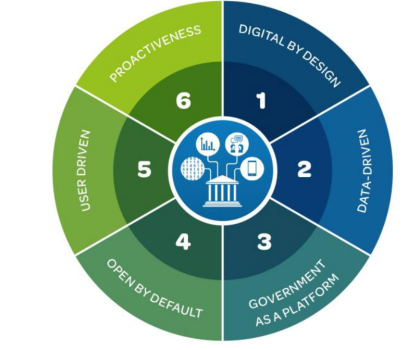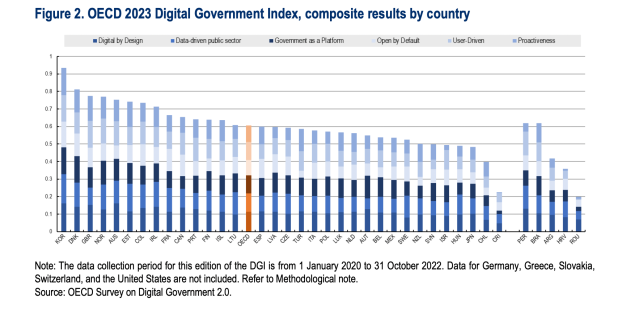
Australia has been ranked among the world’s top ten performers in the OECD Digital Government Index (DGI) and is the top rated country for digital design.

Australia rated highly in five out of six areas, but dropped in the rankings when it came to openness of government data.
The latest OECD Digital Government Index benchmarks 39 governments around the world with regard to public sector digital transformation based on data from January 2020 to the end of October 2022.
The OECD says the index is a valuable resource for policymakers to support policy reforms which increase government productivity, enhance government services, and improve people’s lives.
Countries were rated on ‘digital by design’, ‘data driven’, ‘government as a platform’, ‘open by default’, ‘user driven’ and ‘proactive’.
Top Ten
Australia comes in at sixth overall among the top ten digital governments, behind ladder leaders Korea, Denmark, United Kingdom and Norway, and followed by Estonia, Colombia, Ireland, France and Canada.
“The balanced performance of these countries across the six dimensions reflects their comprehensive efforts in the implementation of digital government policies,” the report says

Digital by design
Australia topped the digital by design category, which measures how governments facilitate the use of digital tools and data when formulating policies or transforming public services.
“This result can be attributed to sustained efforts from governments to reinforce the foundations of digital government, especially designing and adopting strategies and setting the adequate institutional structures for their implementation,” the report says.
Korea, United Kingdom, Denmark, Ireland, Canada, Colombia, Portugal, Austria, and Norway rounded out the top ten.
Data-driven
Australia ranked eighth for data-driven government, which measures advancements in governance, and enablers for data access, sharing and re-use across the public sector.
Korea, Estonia, Ireland, Norway, Denmark, France and Colombia led the list. Lithuania, and Sweden ranked ninth and tenth respectively.
“In all these countries, the management and use of government data is a strategic priority, reflected in comprehensive efforts to strengthen data governance in the public sector and enhance data access and sharing,” the OECD says.
Government as a platform
Government as a platform measures the use of guidelines, tools, data, digital identity and software to enable teams to advance digital transformation across the public sector.
This includes digital identity, service platforms and apps, digital notifications, digital payments, and cloud infrastructure. It also encompasses common standards for service design, agile project management and ICT procurement.
The top-ten performers in order were Korea, Denmark, Norway, Austria, Australia, Estonia, UK, Latvia, Finland, and Luxembourg.
User-driven
Australia was fourth when it came to the governments’ capacity to put the user at the centre of the design of public policies and services.
The top ten performing countries are the United Kingdom, Korea, Norway, Australia, Portugal, Colombia, Canada, Denmark Ireland, and Türkiye.
“They have all developed whole-of-government standards or guidelines for service design, with fundamental principles, such as understanding user needs and expectations, and involving users in the design and delivery of services,” the report says.
Proactiveness
Australia also did well in terms of governments’ capacity to anticipate the needs of users and service providers, with another top ten ranking.
The top ten performers in this dimension were Korea, Estonia, the United Kingdom, Denmark, Türkiye, Norway, Australia, Iceland, Ireland and Finland.
The OECD said all top ten countries showed they proactively engaged a range of actors including citizens other tiers of government in the development of digital government services.
“They also have conducted government-wide consultations on the impact of digital tools for improving government services,” the report says.
Open by default
Openess of data was the only category where Australia failed to score a top ten spot, limping in at number 22.
‘Open by default’, according to the OECD, measures open data strategies, including public catalogues of government services, initiatives that promote the digital rights of citizens and transparency around digital infrastructure like digital identity systems.
“A low performance in the open by default dimension underscores the need for governments to promote a culture of openness by fostering the use of technologies and data to communicate and engage with different actors, as well as ensuring access, availability and re-use of open government data.
“Strengthening efforts to develop open-source policies, ensure algorithmic transparency, and deploy digital public infrastructure in ways that are fair and open would also be important to progress on this dimension and support digital inclusion.”
Balancing benefits and risks
The OECD says governments today are operating in a demanding and evolving digital environment, with a range of challenges including rapid technological advancements and citizen expectations of seamless services.
It says Covid saw the rapid digitisation of government serves but after the pandemic, it’s become clear that accelerating public sector digitisation doesn’t automatically lead to better outcomes.
“Looking to the future, the challenge is for governments to take a strategic approach to digital government that both builds on the progresses made during COVID-19 and seeks to deliver results in the long term,” the report says.
“To increase the effectiveness and efficiency of the public sector, governments are required to become more flexible and future-oriented to capture the benefits of the digital transformation while mitigating its potential risks.”
Comment below to have your say on this story.
If you have a news story or tip-off, get in touch at editorial@governmentnews.com.au.
Sign up to the Government News newsletter